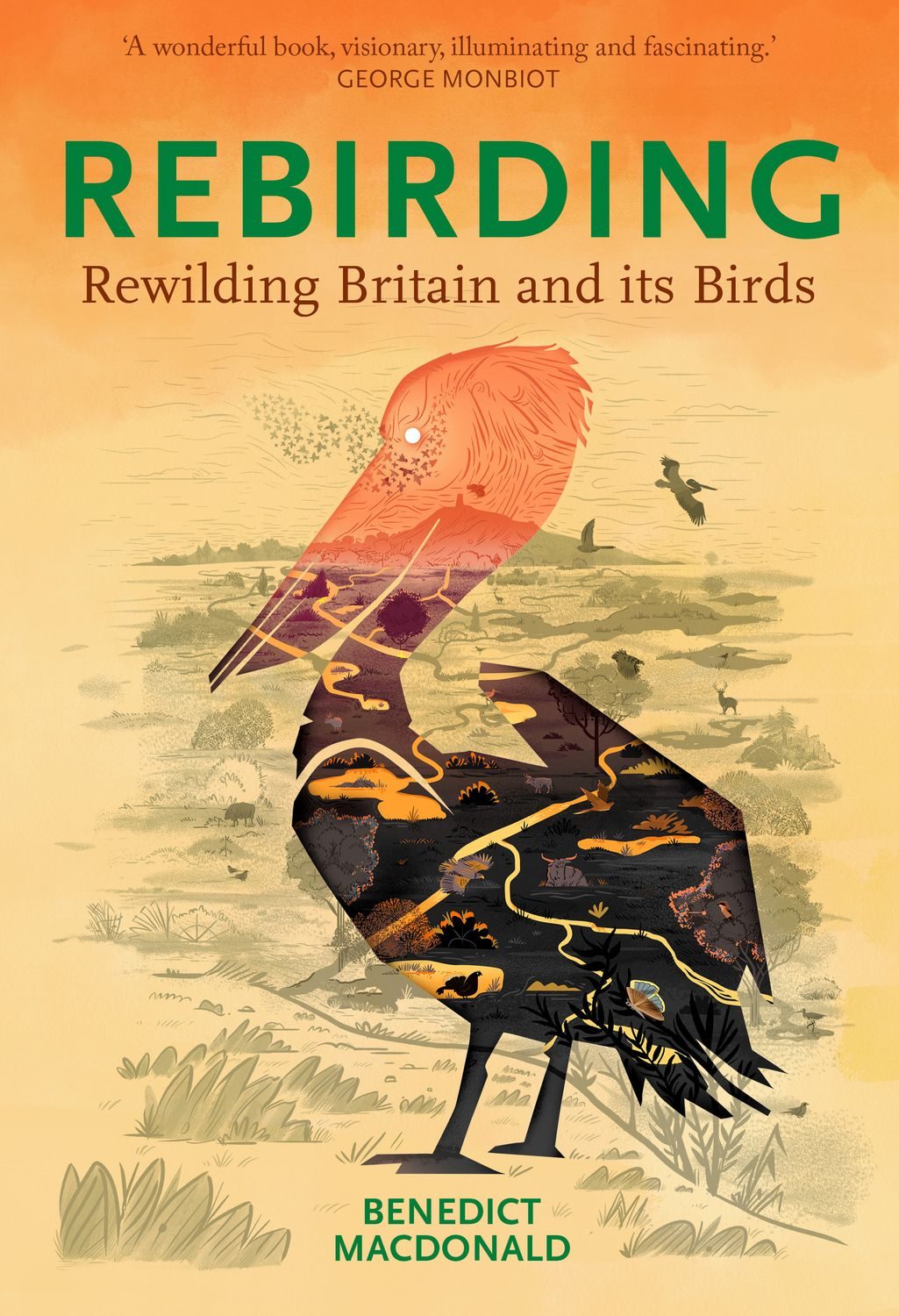Did you know that 94% of Britain isn’t built upon, that Snowdonia is larger and emptier than the Maasai Mara National Reserve, or that Scotland’s deer estates alone cover an area twice the size of Yellowstone National Park? Britain has all the empty space it needs for an epic wildlife recovery. So what’s stopping it from happening in our country – and how can we turn things around?
Rebirding: Rewilding Britain and its Birds is a bold roadmap to reverse the decline of bird populations in Britain, suggesting we need to restore ecosystems, rather than modify farmland.
Author, Benedict Macdonald offered his valuable time to answer our questions about his important new contribution to the discussion of rewilding.

What inspired you to become so passionate about restoring natural ecosystems?
In 2014, I began writing Rebirding in the certain knowledge that conservation in this country is failing, the birdsong around us is dying out every year, yet we have all the resources, skill and wildlife lobby to turn things around. I hope that in its small way, Rebirding will do for the UK what Sir David Attenborough’s Our Planet is beginning to do for worldwide conservation – to make people realise that nature is essential, profitable and saveable, even now – and that we have all the resources and skill to do so.
Tell us a little about your background and how you became interested in the natural world?
I never remember the moment of first being fascinated by nature, but I do remember that by the time I was five, I would make weekend visits to Berkeley Castle Butterfly Farm and was entranced by watching the butterflies drinking salts from my fingertips, and I began a collection of ones passed to me by the lady running it – after they had died. Then early trips to the Welsh coast, and Norfolk, transformed that interest into a lifelong love of birds as well. From there, their plight has drawn me into understanding and studying ecosystems and a far wider understanding of protecting nature. Since then, my love of the natural world, both as a naturalist and a TV director, has now taken me to over forty countries.
At 14, I first remember telling someone at a dinner party that I wanted to work in wildlife television. Since graduating from university, I’ve been lucky to work on a range of programmes such as Springwatch, The One Show and The Hunt for the BBC. Last week, aged 31, I attended the premiere of Sir David Attenborough’s Our Planet for Netflix, launching in the Natural History Museum in London. This is the largest conservation series ever made. I work as the researcher and a field director for the Jungles and Grasslands episodes, directing a number of sequences including desert-nesting Socotra cormorants, the secret life of the Alcon Blue butterfly, and the remarkable lives of the world’s only tool-using Orangutans.
In your opinion, what is the most detrimental practice to the wildlife of Britain?
We are often sold the untruth that what happens to British land is necessary for food production. This is almost entirely untrue. Only the profitable arable farms of the south, and east of our island, provide a bounty of food for our children. Dairy lawns and sheep farms in fact create tiny volumes of our daily diet relative to the land area they use. For example, 88% of Wales grows lamb, an optional food resource.
Of the epic wastage, however, the grouse moor is the ultimate. Eight percent of Britain’s land is burned for the creation of 0.0008% of its jobs and a contribution of just 0.005% to our GDP. For hundreds of years, thousands of beautiful wild animals have been removed, just so that Red Grouse can be turned into living clay pigeons and killed in their thousands once a year. Even hunters from other countries find this wasteful and disgusting. This area covers an area twice the size of Yellowstone National Park – blocking jobs and wildlife alike on an epic scale. Hunting estates in Finland or Sweden, by contrast, juggle the ambition of hunters to shoot a few animals with ecosystems of immense beauty and variety.
Wildlife and commerce are often presented as being in conflict, do you think this is a fair assessment, or can land stewardship that favours biodiversity over profit be of economic benefit?
This is surely the greatest imaginary conflict of our time, successful insinuated, perhaps, by the damaging economies that prevent nature from reaching its full economic potential in our country. In truth, wildlife IS commerce. Nature IS money.
Every year, even without a single charismatic megafauna such as Bison, Elk or Lynx running wild in our country, without a ‘Yellowstone’ or ‘Maasai Mara’, the English adult population make just over 3 billion visits to the natural environment each year, spending £21 billion as they do so. In Scotland, nature-based tourism is estimated to produce £1.4 billion per year, along with 39,000 FTE jobs.
In contrast, the current models of upland farming demand money from us to survive, but they do not reciprocate jobs, income or natural capital – this is life on benefits and there is no future for young people in it. In contrast, wherever nature is allowed to flourish, it’s capital potential is wondrous. In 2009, the RSPB’s lovely but very small reserves brought £66 million to local economies, and created 1,872 FTE jobs. This is more than all of England’s grouse moors, but in just a fraction of their land area.
Right now, however, we are just seeing snapshots of how nature can power and rekindle communities. In Rebirding we often look to other countries to see how true ecosystems could transform economies on a far greater scale. The final myth that we kick into touch is that Britain is short of space, 94% of our country is not built upon. Most of this area does not create essential food supplies – and is jobs-poor.
Is there one single practise or cultural shift that would be of most benefit to restoring natural ecosystems?
The Forestry Commission is the largest single land manager in Britain. It now needs to split its forests in two – rewilding key estates like the New Forest and the Forest of Dean: cutting down the spruce and replanting with native trees, then, crucially, leaving large native animals such as Beavers, Elk, cattle and horses to become the foresters. Economies in these forests would be driven through ecotourism revenues and perhaps some hunting. Elsewhere, timber forests would remain. It is hard to think of one single decision that could effect a greater transformation on British land than a decision to return Britain’s once world-class oak-lands to our nation. Another, however, would be if Scotland’s deer estates, which again cover an area twice the size of Yellowstone, could be incentivised to rewild and regrow their trees. Hunting could remain – but in this regrowing wilderness would be the potential for Elk, Lynx, Wildcats and a huge expansion in woodland species like Capercaillie.
Are you optimistic for the future of Britain’s wildlife?
Yes – but only if our conservationists act with the same pragmatism and determination as those who have prevented land reform for decades. In my closing chapter, I’ve argued that whilst farming unions behave with absolute conviction and coherence, our nature charities often simply say that a few more Skylarks would be nice. Only if we can unlock the economic arguments of nature, and harness the millions of voices effectively, will we see large areas rewilded in our country. It is the social and economic transformation that nature provides that needs to be realised – but for that, you need space, and power over land. At that moment, things will change. In my lifetime, I genuinely believe that after many fierce battles, we will see Dalmatian Pelicans flying over Somerset, and huge areas of Scotland, Wales and upland England slowly returned to a wilder state. But without absolute conviction this is possible, it will never come to pass.
Benedict Macdonald’s book is out now as part of our Spring Promotion
To discover further reading on the past, present and future of the British countryside, browse our collection.







